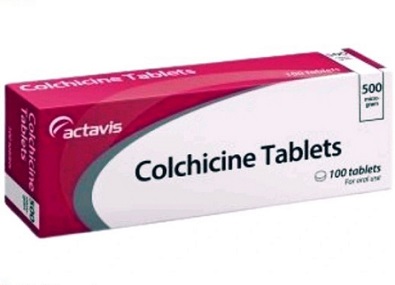Colchicine Reduces Need For Supplemental Oxygen And Reduces Risk Of Mortality In Severe COVID-19 Cases
Nikhil Prasad Fact checked by:Thailand Medical News Team Apr 21, 2024 1 year, 9 months, 1 week, 3 days, 4 hours, 40 minutes ago
COVID-19 News: The global healthcare landscape has been significantly impacted by the Coronavirus disease 2019 (COVID-19) pandemic caused by the coronavirus-2 (SARS-CoV-2). The pandemic's scale and severity necessitated robust efforts to understand and manage the disease, ranging from flu-like symptoms to severe pneumonia and mortality. By September 2022, the world had seen over 600 million cases and more than 6 million deaths attributed to COVID-19. Amidst this crisis, researchers at Ain Shams University in Cairo, Egypt, conducted a meta-analysis that is covered in this
COVID-19 News report, to evaluate the potential effectiveness of colchicine in treating COVID-19 patients, particularly in severe cases where oxygen therapy and mortality risk are significant concerns.
 Thailand Medical
Thailand Medical News had previously covered on the merits of Colchine to treat COVID-19.
https://www.thailandmedical.news/news/covid-19-drugs-canadian-colcorona-study-shows-that-colchicine-can-reduce-certain-complications-of-covid-19
https://www.thailandmedical.news/news/covid-19-drugs-international-study-finds-colchicine-effective-for-non-hospitalized-covid-19-patients
https://www.thailandmedical.news/news/breaking-colchicine-an-ancient-pharmaceutical-shows-positive-results-in-early-clinical-trial-to-treat-severe-covid-19-
https://www.thailandmedical.news/news/covid-19-pneumonia-drugs-colchicine-being-studied-to-prevent-cytokine-storms-in-patients
Background: COVID-19 and Its Clinical Impact
COVID-19 emerged in Wuhan, China, in late 2019, quickly evolving into a global pandemic. Unlike previous coronavirus outbreaks (SARS-CoV and MERS-CoV), SARS-CoV-2 exhibited higher infectivity and geographical spread, posing unprecedented challenges to healthcare systems worldwide. The disease's clinical manifestations vary widely, from mild flu-like symptoms to severe respiratory distress and systemic inflammatory responses leading to mortality. The primary mode of transmission is through respiratory droplets and aerosols, with indirect transmission also documented.
The pathophysiology of COVID-19 involves viral invasion, inflammatory responses, coagulation dysregulation, and cytokine storms, particularly in severe cases. These mechanisms underscore the urgent need for effective treatments to manage the disease and reduce its morbidity and mortality rates.
&
;nbsp;
The Potential Role of Colchicine: Mechanisms and Rationale
Colchicine, an alkaloid drug derived from the Colchicum autumnale plant, has long been used to treat autoinflammatory conditions like gout and familial Mediterranean fever. Its anti-inflammatory effects are mediated through various mechanisms, including the inhibition of superoxide production, interleukin release, and inflammasome activation. Colchicine also modulates fibrotic processes and has been explored in viral myocarditis and other inflammatory conditions.
Given its immunomodulatory properties, researchers hypothesized that colchicine could be repurposed for COVID-19 treatment, targeting the inflammatory cascade and potentially improving clinical outcomes, especially in severe cases requiring oxygen therapy and facing high mortality risks.
Objective and Methodology of the Meta-analysis
The primary objective of the meta-analysis conducted at Ain Shams University was to assess the evidence supporting colchicine's efficacy in COVID-19 treatment. A comprehensive literature review up to May 2022 yielded 814 articles, from which 8 clinical trials and cohort studies meeting inclusion criteria were selected for analysis. These studies collectively involved 16,488 patients, with half receiving colchicine and the others serving as controls (receiving placebo or standard care).
Results and Clinical Implications
The meta-analysis revealed several key findings regarding colchicine's impact on COVID-19 outcomes:
-Mortality Reduction: Patients treated with colchicine showed a significant reduction in mortality rates compared to those in the control groups. This finding aligns with previous systematic reviews and meta-analyses, indicating a potential survival benefit associated with colchicine use in COVID-19 patients.
-Oxygen Therapy Needs: Colchicine administration significantly decreased the need for oxygen therapy among COVID-19 patients. This outcome is crucial, especially in severe cases where respiratory support is a critical determinant of patient outcomes.
-Hospitalization Rates: While colchicine did not significantly influence overall hospitalization rates, a subgroup analysis among PCR-confirmed COVID-19 patients hinted at a modest reduction in hospitalizations. This subgroup-specific benefit underscores the importance of precise patient selection and tailored treatment approaches.
-ICU Admissions and Mechanical Ventilation: Colchicine did not demonstrate substantial effects on ICU admission rates or the need for mechanical ventilation compared to standard care or placebo. These findings suggest that while colchicine may improve certain outcomes, its impact on critical care needs remains limited.
Discussion: Unpacking the Meta-analysis Findings
The meta-analysis's outcomes prompt a deeper discussion on colchicine's role in COVID-19 management:
-Anti-inflammatory Mechanisms: Colchicine's anti-inflammatory mechanisms likely contribute to its observed benefits, including reduced mortality and oxygen therapy requirements. By modulating cytokine release and inflammatory cascades, colchicine may mitigate the hyperinflammatory responses characteristic of severe COVID-19.
-Timing and Treatment Regimens: The meta-analysis highlights the potential benefits of early colchicine administration, especially in the context of reducing mortality rates. Optimal dosing and treatment durations warrant further investigation to maximize therapeutic efficacy.
-Patient Subgroups: Variability in outcomes across different patient subgroups underscores the need for personalized medicine approaches in COVID-19 treatment. Factors such as disease severity, comorbidities, and viral load may influence colchicine's effectiveness and should guide treatment decisions.
Conclusion: Implications for Clinical Practice and Future Research
In conclusion, the meta-analysis conducted at Ain Shams University provides compelling evidence supporting colchicine's role in COVID-19 management, particularly in reducing mortality rates and oxygen therapy needs. These findings hold significant implications for clinicians, highlighting colchicine as a potential therapeutic intervention deserving further exploration and optimization.
Moving forward, future research should focus on refining colchicine treatment protocols, elucidating its mechanisms of action in COVID-19 pathophysiology, and identifying specific patient populations most likely to benefit from this intervention. By leveraging existing drugs like colchicine and continuously advancing our understanding of COVID-19 treatment strategies, healthcare providers can better navigate the complexities of this ongoing pandemic and improve patient outcomes.
The study findings were published in the peer reviewed journal: BMC Pulmonary Medicine.
https://bmcpulmmed.biomedcentral.com/articles/10.1186/s12890-024-03001-0
For the latest
COVID-19 News, keep on logging to Thailand Medical News.
Read Also:
https://www.thailandmedical.news/news/university-of-virginia-study-shows-that-colchicine,-a-drug-to-treat-gout-also-helps-improves-survival-rates-of-heart-failure-patients
